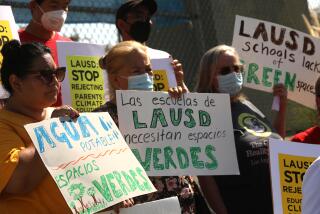Least-Toxic Program Can Help
- Share via
When a chemical is designed to kill something--be it rat, bug, fungus or weed--it just makes common sense for people to consume as little of it as possible. Regardless of what dosage of a particular substance might be deemed acceptable by regulatory agencies, limiting total exposure can only be a good idea.
That’s especially true for children, whose smaller size and higher activity level makes them especially vulnerable.
We salute the Ventura Unified School District for implementing a policy known as least-toxic integrated pest management. It emphasizes good sanitation practices and nontoxic materials to prevent pest and weed infestations, rather than routine spraying with poisons. Such common weapons as steam and soap can do the job when used correctly.
Since adopting the policy a year ago, the district has hired a consultant to help its schools make the change. Phil Boise, program manager for Community Environmental Council, believes that steam and soap and water are better than the neurotoxin the district formerly used to control ants.
It will take a little more effort to keep schools bug- and weed-free without the easy and effective poisons that many custodians--and homeowners--routinely reach for. But the effort is worth it for whatever improvement it makes in the overall health of the community’s kids.
Similarly, a bill introduced by state Assembly member Hannah-Beth Jackson (D-Santa Barbara) seeks to reduce the chances of pesticide drift onto school campuses from nearby farm operations. If passed, Assembly Bill 947 would enable county agricultural commissioners to protect public health by regulating all pesticide applications near sensitive sites such as schools, day-care facilities, hospitals and nursing homes. It would increase the fines that could be levied against those responsible for exposing the public to pesticides. And it would require schools adjacent to agricultural land to create a safety plan specifically for pesticide drift and accidental exposure.
This bill--inspired by a November incident in which a cloud of the pesticide Lorsban drifted from a lemon orchard onto the adjacent Mound Elementary School in Ventura--represents the combined effort of an unusually broad spectrum of Ventura County residents. They include parents of Mound School students, the president of the Mound Elementary School Parent-Teacher Organization, Ventura Unified School District Supt. Joseph Spirito and other school district officials, Ventura County Agricultural Commissioner Earl McPhail, public health officials, state agency staff members and representatives of the Ventura County Farm Bureau, Ventura County Agricultural Assn., Environmental Defense Center, Sierra Club and Community and Children’s Advocates Against Pesticide Poisoning.
Today’s world is full of chemicals designed for specific purposes, chemicals that sometimes end up in unforeseen locations where they have the potential to cause unintended harm. Actions like AB 947 and least-toxic programs in schools can help.
More to Read
Sign up for Essential California
The most important California stories and recommendations in your inbox every morning.
You may occasionally receive promotional content from the Los Angeles Times.










